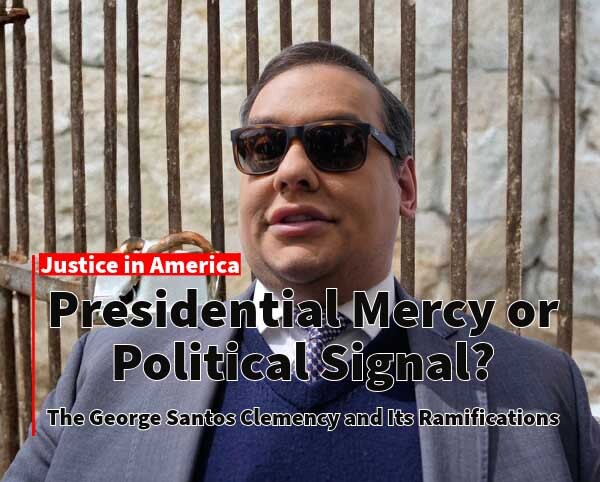 News Staff
News Staff![]() -
October 19, 2025 -
Politics
President Trump
GEORGE SANTOS
Clemency
-
617 views -
0 Comments -
0 Likes -
0 Reviews
-
October 19, 2025 -
Politics
President Trump
GEORGE SANTOS
Clemency
-
617 views -
0 Comments -
0 Likes -
0 Reviews

DLNews Politics:
Presidential Mercy or Political Signal? — The George Santos Clemency and Its Ramifications
When former Congressman George Santos—once expelled from the House and convicted of wire fraud and aggravated identity theft—had his seven-year prison sentence commuted by President Trump, it set off a cascade of reactions across the country. Legal scholars questioned the constitutional reach of the presidency, commentators debated fairness and accountability, and ordinary citizens wondered what the message really is.
Santos’s fall from grace was spectacular. Elected in 2022, he was later exposed for fabricating much of his biography, misusing campaign funds, and engaging in schemes involving donor credit cards. He pleaded guilty to two felony counts in April 2025 and was sentenced to nearly seven years in prison. Then, in mid-October, President Trump announced that he was commuting Santos’s sentence—an act of clemency that released him immediately.
Why did the president do it? Trump said the punishment was “excessive,” arguing that Santos had been treated unfairly and deserved a second chance. Supporters claimed his case exemplified government overreach against non-violent offenders. Others saw the move as political loyalty rewarded—Santos was, after all, a staunch Republican who defended Trump even after his own downfall. The timing, just weeks before a tense election season, added to the controversy.
Under the U.S. Constitution, a president has broad power to grant clemency, including pardons and commutations, for federal offenses. It’s one of the few powers almost completely shielded from congressional or judicial oversight. In Santos’s case, Trump commuted the sentence rather than issuing a full pardon—meaning Santos’s conviction still stands, but his prison term was eliminated.
The message this sends is complicated. On one hand, it underscores the notion that mercy and rehabilitation still have a place in American justice. On the other, it fuels public skepticism that the law applies differently to the powerful and politically connected. Many Americans question whether an ordinary citizen convicted of fraud would ever receive such leniency.
Critics argue that this clemency undermines public trust in the justice system, suggesting that personal loyalty can outweigh integrity and accountability. Supporters counter that harsh sentencing for non-violent offenders deserves scrutiny and that clemency is a necessary check on judicial excess. Whichever view prevails, the decision has reignited a national conversation about fairness, forgiveness, and favoritism.
For society at large, the Santos clemency serves as a vivid reminder of the power—and the peril—of presidential mercy. It asks us to consider what kind of justice we want: one guided by principle, compassion, or politics. And it leaves a lingering question that will echo through history: when the president extends mercy, is it truly an act of conscience—or an act of calculation?

Desert Local News is an invitation-only, members-based publication built on fact-checked, non-biased journalism.
All articles are publicly visible and free to read, but participation is reserved for members—comments and discussion require an invitation to join.
We cover local, state, and world news with clarity and context, free from political agendas, outrage, or misinformation.